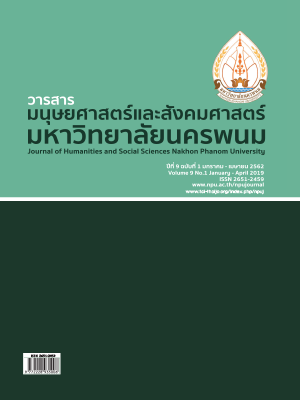Enhancing a Peace Culture in Schools: A Grounded Theory Study A GROUNDED THEORY RESEARCH
Main Article Content
Abstract
This research aims to offer theoretical conclusions enhancing the culture of peace in schools. Research using grounded theory. Research areas is a secondary school in accordance with the objectives of the research. Data were collected by in-depth interviews as well. Which is the primary administrators, teachers, parents, students and supervisors. Data is analyzed by means of translation and interpreting data. By analyzing the data in the format of systematic Strauss and Corbin (1998), and the researchers used
a computer program ATLAS.ti enables organizations to analyze data and to offer theoretical conclusions.
The research found that enhancing the culture of peace has meant the phenomenon as people are encouraged to help teachers recognize and resolve problems in a peaceful way. The goal is Teachers and student leaders Review the vision of the school Design and peace education curriculum reform both structural and psychological. How motivating. Participation Support resources and information needed for the development of teacher education causal conditions classified as external conditions and conditions within the school. Has resulted in a strategic function in the manner of a Paradigm shift in education. Systems analysis knowledge Take advantage of the network the study was to establish cooperation between them. The sequel happens is that teachers have the potential to run up. Teacher job satisfaction. Feel part of the organization Organizational Commitment School is a workflow system effectiveness School and atmosphere, it works great.
Article Details
References
ดาวรุวรรณ ถวิลการ. (2552). วัฒนธรรมองค์การในโรงเรียนรางวัลพระราชทาน : การวิจัยเชิงชาติพันธุ์วรรณนา. วิทยานิพนธ์ปริญญาปรัชญาดุษฎีบัณฑิต มหาวิทยาลัยขอนแก่น.
ไพศาล วิสาโล. (2550). สันติวิธีและปฏิบัติการไร้ความรุนแรง. กรุงเทพฯ: ศูนย์ศึกษาและพัฒนาสันติวิธี มหาวิทยาลัยมหิดล.
ยุวธิดา ชาปัญญา. (2554). การเสริมสร้างพลังอำนาจของครูในโรงเรียนประถมศึกษา: การวิจัยทฤษฎีฐานราก. วิทยานิพนธ์ปริญญาปรัชญาดุษฎีบัณฑิต สาขาวิชาการบริหารการศึกษา บัณฑิตวิทยาลัยมหาวิทยาลัยขอนแก่น.
วันชัย วัฒนศัพท์ และคณะ. (2548ข). คู่มือการเจรจาไกล่เกลี่ยในสถานศึกษา. กรุงเทพมหานคร : โรงพิมพ์คลังวิชา.
วันชัย วัฒนศัพท์. (2548ก). การแก้ปัญหาความขัดแย้งในสถานศึกษา. กรุงเทพมหานคร : สถาบันพระปกเกล้า.
วันชัย วัฒนศัพท์. (2549). ความขัดแย้ง ทางออกด้วยสันติวิธี. กรุงเทพมหานคร : ศิริภัณฑ์ออฟเซ็ท.
ศศิรัศม์ วีระไวทยะ. (2554). การนำเสนอยุทธศาสตร์การสร้างเครือข่ายความร่วมมือเพื่อเสริมสร้างสันติวัฒนธรรมโดยใช้สถานศึกษาเป็นฐาน. วิทยานิพนธ์ปริญญาครุศาสตรดุษฎีบัณฑิต สาขาวิชาพัฒนศึกษา ภาควิชานโยบายการจัดการ และความเป็นผู้นำทางการศึกษา คณะครุศาสตร์ จุฬาลงกรณ์มหาวิทยาลัย.
Charmaz, K. (2000). Grounded theory: Objectivist and constructivist methods. In N.K. Denzen and Y.S. Lincon (Eds.) Handbook of qualitative research. 2nd ed. California: Sage.
Hoy, W.K. and Miskel, C.G. (2005). Educational administration: Theory, research and practice. 7th ed. Boston: McGraw Hill.
Strauss, Anselm L. The Discovery Grounded Theory: Strategies for Qualitative Research. Aldine, pp 271. 1967.


